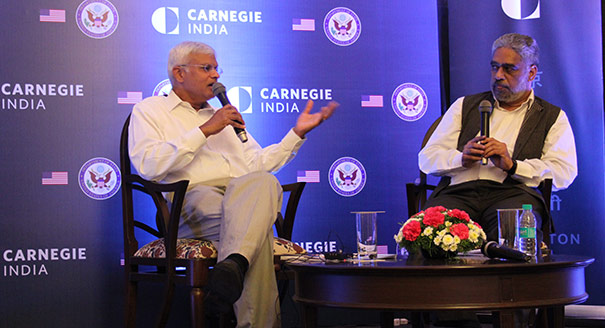Registration
Thank you!
You will receive an email confirming your registration.
Carnegie India, in collaboration with the embassy of the United States of America in New Delhi, hosted a talk by Ashley J. Tellis, senior associate at the Carnegie Endowment for International Peace. His lecture brought together scholars, diplomats, and key stakeholders interested in Indo-U.S. relations. Tellis’ talk was followed by a conversation with C. Raja Mohan, director of Carnegie India.
DISCUSSION HIGHLIGHTS
- A Realistic Foreign Policy: Tellis painted President Obama’s legacy in bold strokes to portray his successes in the realms of domestic and foreign policy. While there may be genuine criticism levelled against President Obama’s actions, Tellis contended that in the grander scheme of things, Obama was successful in crafting policy that balanced his own philosophical convictions with the national mood without compromising on the U.S. commitment to the international community.
- A Three-Part Approach: Tellis argued that President Obama’s grand strategy comprises a three-pronged approach:
- American Restraint: First, it involves intentional restraint in expending resources on problems that are not instrumental to American strategic aims. Armed with a deep understanding of the limits of American power, President Obama has viewed America’s national interests through the strict test of consequences, Tellis said. By avoiding the wasteful expenditure of resources, the United States was more able to focus on domestic revitalization, which is crucial to the country’s long term aspirations of maintaining its position at the helm of world affairs.
- Wary of Knee-jerk Assertiveness: Second, Tellis argued that President Obama has eschewed a reactionary approach in favor of a concerted effort at meeting adversaries half-way. Given resource constraints, the Obama administration has employed an astute foreign policy aimed at a calculated balance between an outstretched hand of friendship and debilitating measures aimed at punishing antagonists.
- Emphasized Collective Action: Finally, Tellis said, President Obama began to focus on collective action rather than the unilateral exercise of power, believing that increasingly complex global crises necessitated cooperation by the international community. Tellis explained that this stems not only from President Obama’s own liberal worldview, but also his aim of safeguarding American resources by sharing the burden of international security.
- Beholden to Circumstance: Despite the success of this strategy, Tellis cautioned it was bound to be transient. Historically, he said, there is a cyclical shift between restraint and assertiveness in American presidencies over the decades. The foreign policy approaches adopted by various administrations were above all a consequence of the circumstances that confronted them. He explained that President Obama, who was elected to office with a historic mandate for change, strived consciously to focus on nation-building at home. However, Tellis said, American policy would not hesitate to make the shift from retrenchment to assertiveness given different circumstances.
- The Enduring Nature of Geopolitical Competition: Tellis argued that President Obama once thought American restraint would increase international cooperation, but is on the cusp of leaving office with the conviction that geopolitical competition will endure. The emphasis he laid on the pivot to Asia and intra-Asia balancing has not only cemented a partnership with India that enjoys bipartisan support, but has also laid the foundations to bolster the United States’ strategic supremacy.
This event summary was prepared by Arushi Kumar, a research assistant at Carnegie India.
